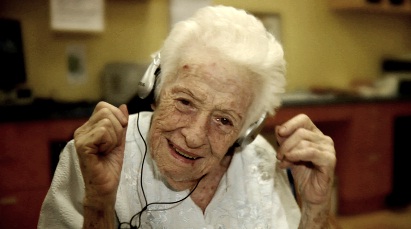
Music therapy and the uses of music
Music possesses a power beyond what words can describe, especially for people with dementia. Language is processed through just one centre of the brain but music’s unique qualities of pitch, rhythm and melody are processed by many different parts of the brain. Music therapy takes the power of music to explore what cannot be described by words.
The technical definition of music therapy is therapeutic use of music to facilitate clinical goals. It involves the skillful use of music and musical elements—such as its nonverbal, creative, structural, and emotional qualities—by an accredited music therapist (MTA), a distinction provide by the Canadian Association for Music Therapy (CAMT). For people with Alzheimer’s disease or other forms of dementia, music therapy provides a therapeutic environment to maintain or improve emotional and cognitive well-being
My own work as a music therapist began with an internship at the Alzheimer Society of Sudbury-Manitoulin where we applied these ideas to its day program. Music therapy groups helped people with dementia connect with other group members, talk about memories of their youth and let go of their creative inhibitions throughout the session. It was a great success.
For those unable to attend group sessions, individual music therapy sessions help a person manage anxiety or provide sensory stimulation.
For both group and individual sessions, the music therapist must assess and document the course of treatment to achieve clinical goals. Music used in the sessions is selected carefully to ensure it is familiar to the participants.
But such techniques are not only for professionals. Caregivers also can use the musical preference of a family member with Alzheimer’s disease to interact with her through musical activities. At home, music reduces stress, decreases anxiety, agitation and depression. Music can also set a mood. For example, playing soothing music at meal times can promote a calm response at the table or upbeat music can boost mood. Faster-paced music also encourages movement by clapping and tapping along to the music or even dancing.
However, when playing music, watch how the person you are caring for responds. If the music selection seems to be distressing him, find another piece to get a calmer response. Distractions such as loud background discussions, television or commercials interrupting the music can also over-stimulate or agitate him.
I encourage you to use of music therapy with an accredited music therapist or musical activities within different organizations and in the home. The cognitive benefits of music are enormous and you can have a lot of fun in the process.
Thanks to the Alzheimer Society Sudbury-Manitoulin Chapter for the internship opportunity and Alzheimer Society Ontario for the opportunity to write this blog.
 Ms. Klym graduated with her Bachelors of Music Therapy from the University of Windsor in June 2012. She currently resides in Sudbury, Ontario and in the process of achieving full Music Therapist Accredited status from the Canadian Association for Music Therapy. Her clinical experience includes working with the oncology, dementia, complex continuing care and palliative care in Windsor, Toronto and Sudbury, Ontario.
Ms. Klym graduated with her Bachelors of Music Therapy from the University of Windsor in June 2012. She currently resides in Sudbury, Ontario and in the process of achieving full Music Therapist Accredited status from the Canadian Association for Music Therapy. Her clinical experience includes working with the oncology, dementia, complex continuing care and palliative care in Windsor, Toronto and Sudbury, Ontario.